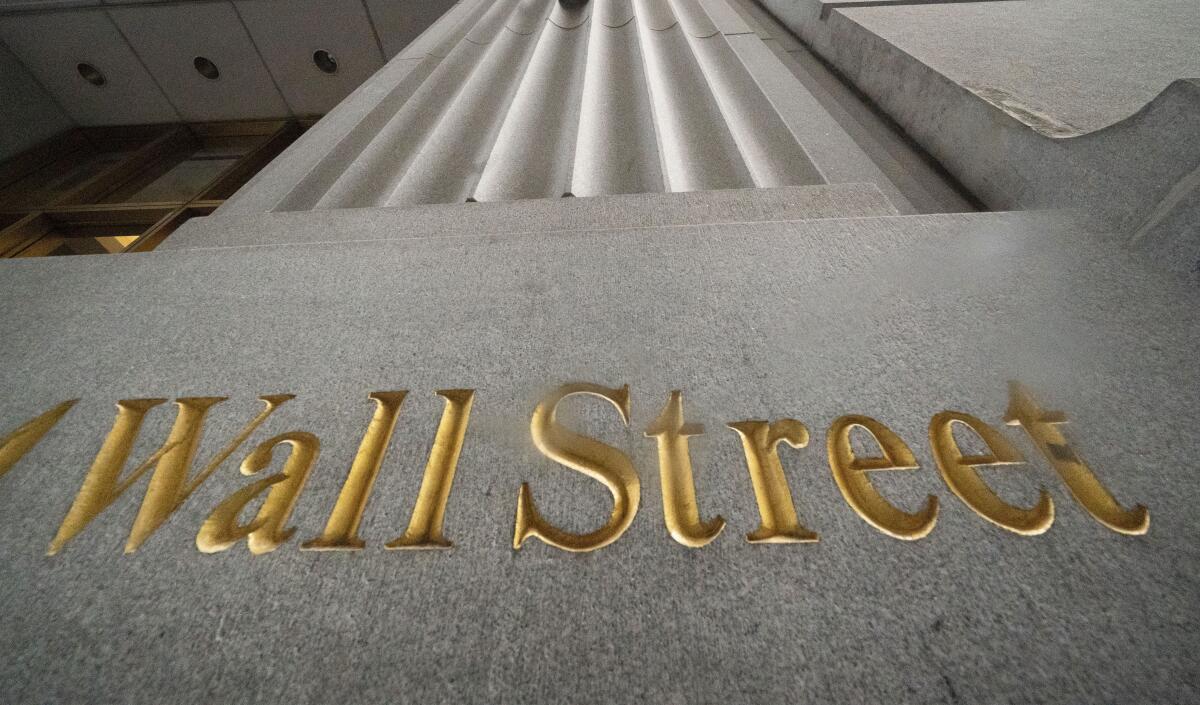Wall Street rallies again, even as bond market signals worry

- Share via
Stocks on Wall Street rallied again Thursday, extending the market’s winning streak to a fourth day and placing the major indexes on pace for weekly gains.
The Standard & Poor’s 500 index rose 1.5%. The latest gain marks the longest winning streak for the benchmark index since March. The Dow Jones industrial average rose 1.1%, while the Nasdaq composite closed 2.3% higher.
Small-company stocks outpaced the broader market, a signal that some investors remain confident of economic growth. The Russell 2000 rose 2.4%.
Most of the market climbed, and energy-producing companies led the way after oil prices recovered a chunk of their sharp losses from earlier in the week. The bond market is still showing signs of worry about a possible recession, though.
A report Thursday showed more workers filed for unemployment benefits last week than expected. A report Friday will show more broadly how the job market is doing.
“We still see a host of macro headwinds that suggest a cautious approach is appropriate here,” said Bill Merz, head of capital markets research at U.S. Bank Wealth Management.
The S&P 500 rose 57.54 points to 3,902.62 as roughly three-fourths of the stocks in the index rose. The Dow rose 346.87 points to 31,384 and the Nasdaq rose 259.49 points to 11,621.35. The Russell 2000 advanced 42.06 points to 1,769.60.
Companies that benefit the most from a healthy economy led the gains, with technology stocks doing much of the heavy lifting. Apple rose 2.4%.
The energy sector also rose as U.S. crude oil prices climbed 4.3% after falling the last few days. Exxon Mobil rose 3.2%.
Inflation hasn’t been this high in decades. We compiled a snapshot of prices at ten grocery chains in the L.A. area. How does your local store stack up?
“Energy prices have been coming down on fears of a recession, along with a host of other industrial commodities,” said Quincy Krosby, chief equity strategist for LPL Financial. “Obviously, there’s still concern about the economy, there’s still concern about where we’re headed and whether the economic backdrop is going to weaken.”
The major indexes are on pace for weekly gains in what has been turbulent trading over the last several months. The volatility reflects growing worries among investors that the economy is slowing under the weight of surging inflation and sharply higher interest rates, pressures that could tip the economy into a recession.
Despite this week’s rally in the stock market, bond investors continue to signal anxiety over a potential recession. New data Thursday showed that the number of Americans applying for unemployment benefits topped the 230,000 mark for the fifth consecutive week. Although claims remain low, last week was the highest level of claims in almost six months.
The yield on the 10-year Treasury rose to 3% from 2.91% late Wednesday. The yield on the two-year Treasury is above the 10-year yield, a relatively rare occurrence seen by some investors as an ominous sign.
The job market in the U.S. has been a key focus for investors this week as they look for any clues on how inflation is affecting the economy. On Wednesday, the U.S. government reported that employers advertised fewer jobs in May amid signs that the economy is weakening and there are already signs that retailers have pulled back on hiring.
A weakening of the broader job market, which has remained strong through the pandemic recovery, could signal that inflation is cooling off. Investors will get a clearer picture Friday when the more detailed June jobs report is released.
“That’s what the Federal Reserve wants it to do, they’re actually thinking that their policies are working because they are increasing slack in the labor markets,” said Zachary Hill, head of portfolio management at Horizon Investments. “As we look to tomorrow and think about how markets should be reading the report, seeing a deceleration in the pace of job growth is a positive in a sense.”
Investors are trying to determine whether a recession is on the horizon as the Fed aggressively raises interest rates to temper pervasive inflation.
Businesses are getting squeezed by higher costs because of supply chain problems and have raised prices on a variety of items, including food and clothing.
Consumers have been pulling back on spending as inflation puts a tighter squeeze on budgets. Russia’s invasion of Ukraine in February sent energy prices surging, resulting in record gasoline prices in the U.S. Pain at the pump has only worsened the broader effect of inflation, though there are signs that gasoline prices have begun to recede.
The key concern is that the Fed’s interest rate hikes could go too far in slowing economic growth and actually bring on a recession. After last month’s meeting, the Fed raised its rate by three-quarters of a point to a range of 1.5% to 1.75% — the biggest single increase in nearly three decades — and signaled that further large hikes probably would be needed.
The recession concerns have been weighing heavily on markets. Every major index is in a slump for the year and the benchmark S&P 500 is in a bear market, or down at 20% from its most recent high. The market is not likely going to regain ground until Wall Street gets clearer signals that inflation is cooling.
Markets in Europe ticked higher on a day that British Prime Minister Boris Johnson announced that he was resigning amid a flood of resignations from his Conservative Party’s members.
More to Read
Inside the business of entertainment
The Wide Shot brings you news, analysis and insights on everything from streaming wars to production — and what it all means for the future.
You may occasionally receive promotional content from the Los Angeles Times.











